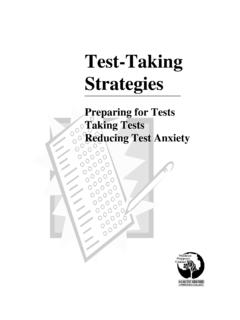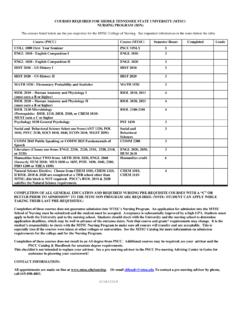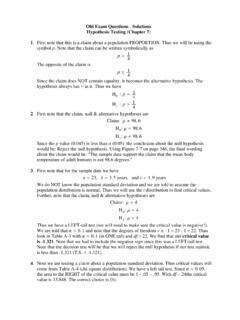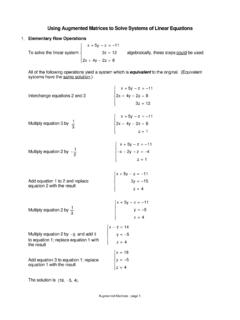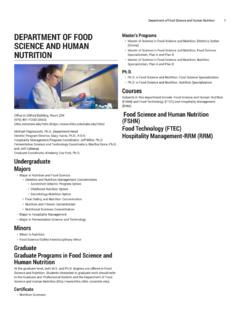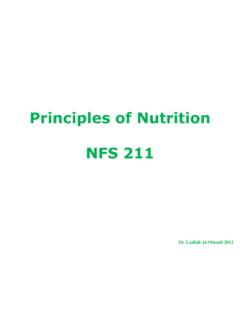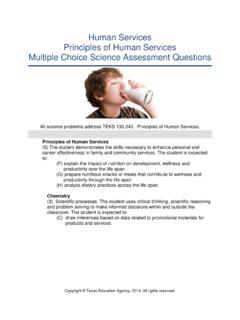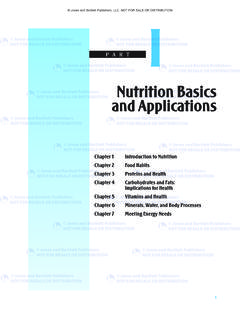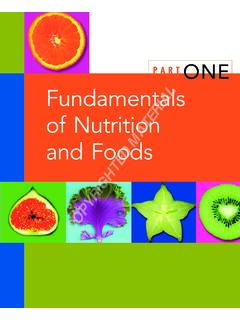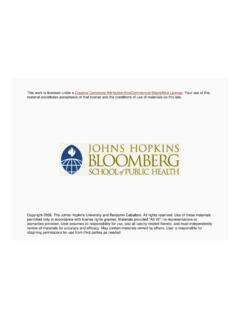Transcription of PRINCIPLES OF NUTRITION BIOL 2400
1 PELLISSIPPI STATE COMMUNITY COLLEGE MASTER SYLLABUS PRINCIPLES OF NUTRITION BIOL 2400 Class Hours: Credit Hours: Laboratory Hours: Revised: Fall 2010 Catalog Course Description: human NUTRITION for the lifespan, including biochemistry of body nutrients, health and disease, government and scientific guidelines. Entry Level Standards: College-level English skills and completion of DSPM 0890. Prerequisites: BIOL 2010 or CHEM 1010 Textbook(s) and Other Course Materials: Whitney and Rolfes. 2008. Understanding NUTRITION , 11th ed. Thomson /Wadsworth Publishing. I. Week/Unit/Topic Basis: Week Topic 1 Chapter 1 - Overview 2 Chapter 2 Planning a Healthy Diet Chapter 3 Digestion, Absorption, and Transport 3 Chapter 3 Digestion, Absorption, and Transport Exam I 4 Chapter 4 - Carbohydrates 5 Chapter 5 - Lipids 6 Chapter 6 Proteins Exam II 7 Chapter 7 - Metabolism 8 Chapter 8 Energy Balance and Body Composition 9 Chapter 9 Weight Management Exam III 10 Chapter 10 Water-Soluble Vitamins 11 Chapter 11 Fat-Soluble Vitamins Chapter 12 - Water and Major Minerals 12 Chapter 13 Trace Minerals Exam IV 13 Chapter 14 Fitness Chapter 15 - Life Cycle NUTRITION : Pregnancy and Lactation 14 Chapter 16 Life Cycle NUTRITION : Infancy, Childhood, and Adolescence Chapter 17 Life Cycle NUTRITION : Adulthood and the Later Years 15 Exam V II.
2 Course Objectives*: A. Thoroughly understand food chemistry so as to know the appropriate and adequate food sources of NUTRITION . V3* B. Understand scientific research methods, so as to discern value of popular diets and other medical information regarding NUTRITION . V2,3,4,5* C. Understand the digestion, absorption and utilization of nutrients in the body and the implications for normal health as well as a variety of NUTRITION -related health concerns. V3,4,5* D. Understand metabolism and energy balance within the body. V3* E. Understand how NUTRITION affects people in different stages of life. V3,5* F. Apply knowledge about NUTRITION in practical circumstances. V3,4* Numbers after course objectives reference TBR s general education goals. III. Instructional Processes*: Students will: 1. Use critical thinking to evaluate the literature. (General Education Communication Outcome, General Education Natural Sciences Outcome*) 2.
3 Use software designed for personal dietary assessment which students will evaluate in comparison to known standards. (Active Learning Strategies, Technological Literacy Outcome, General Education Natural Sciences Outcome, Mathematics Outcome*) 3. Develop a vocabulary that enables students to communicate more effectively with both the public and with a variety of health care providers. (General Education Natural Sciences Outcome, Transitional Strategies*) 4. Gain the knowledge to have the solid foundation in NUTRITION which is necessary for moving on to upper level NUTRITION , nursing, and other health professional courses, and eventually to the job. This will be done by a variety of means, including listening to lectures, guest speakers, viewing videotapes, and participating in group discussions. (Transitional Strategies, Active Learning Strategies, General Education Natural Sciences Outcome*) 5. Examine issues related to NUTRITION , including fad diets, media claims, advertisements, and other similar topics.
4 (Active Learning Strategies, General Education Natural Sciences Outcome*) *Strategies and outcomes listed after instructional processes reference Tennessee Board of Regents goals for strengthening general education knowledge and skills, connecting coursework to experiences beyond the classroom, and encouraging students to take active and responsible roles in the educational process. IV. Expectations for Student Performance*: Upon successful completion of this course, the student should be able to: 1. Describe basic food chemistry, digestive, absorptive and utilization processes in the human body. A,C,D* 2. Understand energy balance and PRINCIPLES of weight management. B,C,D,F* 3. Identify risk factors, elements of current disease state/healthy lifespan, therapeutic measures, and future implications of health concerns related to NUTRITION . B,C,E,F* 4. Use various research and educational tools for the study of NUTRITION .
5 This includes literature and computer-based diet analysis programs. B,F* *Letters after performance expectations reference the course objectives listed above. V. Evaluation: A. Testing Procedures: Each lecture unit will be evaluated using one exam worth 100 points. Exams consist of both objective (multiple choice) and discussion questions. Additional assignments include performing a personal computerized diet and activity analysis, critically analyzing fast food menus, and utilizing knowledge to modify recipes. B. Laboratory Expectations: N/A C. Field Work: N/A D. Other Evaluation Methods: N/A E. Grading Scale: A 90-100 B 80-89 C 70-79 D 60-69 F < 59 VI. Policies: A. Attendance Policy: Pellissippi State Community College expects students to attend all scheduled instructional activities. As a minimum, students in all courses must be present for at least 75 percent of their scheduled class and laboratory meetings in order to receive credit for the course.
6 B. Academic Dishonesty: Academic Misconduct. Academic misconduct committed either directly or indirectly by an individual or group is subject to disciplinary action. Prohibited activities include by are not limited to the following practices: - Cheating, including but not limited to unauthorized assistance from material, people, or devices when taking a test, quiz, or examination; writing papers or reports; solving problems; or completing academic assignments - Plagiarism, including but not limited to paraphrasing, summarizing, or directly quoting published or unpublished work of another person, including online or computerized services, without proper documentation of the original source - Purchasing or otherwise obtaining prewritten essays, research papers, or materials prepared by another person or agency that wells term papers or other academic materials to be presented as one s own work - Taking an exam for another student - Providing others with information and/or answers regarding exams, quizzes, homework or other classroom assignments unless explicitly authorized by the instructor - Any of the above occurring within the Web or distance-learning environment.
7 C. Accommodations for disabilities: Students who need accommodations because of a disability, have emergency medical information to share, or need special arrangements in case the building must be evacuated should inform the instructor immediately, privately after class or in her or his office. Students must present a current accommodation plan from a staff member in Services for Students with Disabilities (SSWD) in order to receive accommodations in this course. Services for Students with Disabilities may be contacted by going to Goins 127, 132, 134, 135, 131 or by phone: 539-7153 or TTY 694-6429. More information is available at D. Other Policies: -Classroom disruptions during lecture, any form of communication during testing, and any other behavior that may prove distracting to other students or the instructor will not be tolerated. -Students are expected to work on NUTRITION related material and participate in class discussion when time permits.
8 Food and drink are not allowed in the classroom. Cellular phones and pagers must be turned off or set on the vibrating mode. Students are expected to stay for the entire length of the class lecture unless they have obtained prior approval to leave early from the instructor. Visitors are not allowed in the classroom.


